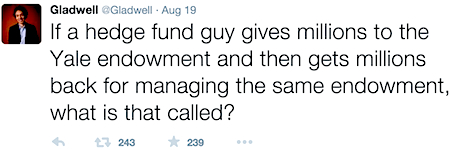Yale University isn’t taking public accusations of hoarding its endowment and overspending on asset managers lying down.
Responding to a New York Times op-ed that called for a higher mandatory endowment spending, Yale released a statement decrying the article’s logic and defending its policies.

“The criticism, which rested on speculation about endowment management costs and inexplicably limited the resources spent on behalf of students only to financial aid and other grants, obscures how much support the endowment provides for Yale, and how affordable Yale is for students,” the university said.
Yale has the nation’s second-largest school fund, with $23.9 billion in its coffers as of June 30, 2014.
The op-ed’s author—a University of San Diego professor specializing in private equity and higher education policy—opened his article with a provocative question.
“Who do you think received more cash from Yale’s endowment last year,” wrote Law Professor Victor Fleischer, “Yale students, or the private equity fund managers hired to invest the university’s money?”
His answer: “It’s not even close.”
Last year, according to Fleischer, Yale paid private equity firms $480 million in fees on its $8 billion allocation. Tuition assistance accounted for $170 million of the endowment’s $1 billion contribution to Yale’s operating budget.

Fleischer’s op-ed drew substantial attention from New York Times readers and an even wider social media audience. Writer Malcolm Gladwell—best-selling author of The Tipping Point and Outliers—weighed in on Twitter, suggesting Yale “spin off its university division and concentrate on its core money management business.”
More than 1,200 people republished or favorited Gladwell’s tweet.
Yale shot back to the criticism, pointing out that the endowment contributes 33% of its budget and spending more could jeopardize the school’s long-term financial health.
“Families with incomes under $65,000 pay nothing for their child’s Yale education,” it noted. The endowment’s spending “prudently balances the competing objectives of providing substantial income to the operating budget now and protecting the value of the endowment over time,” it continued, “so that future generations of students can receive the same extraordinary support as today’s.”
Related: The Endowment Bracket: Harvard, Yale, and the Sweet Sixteen
